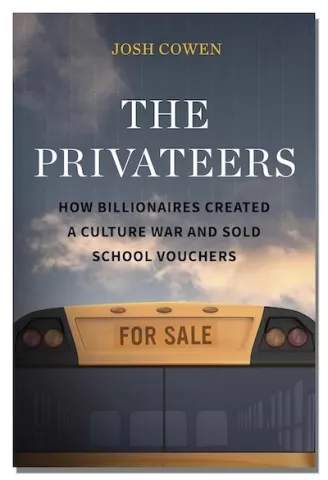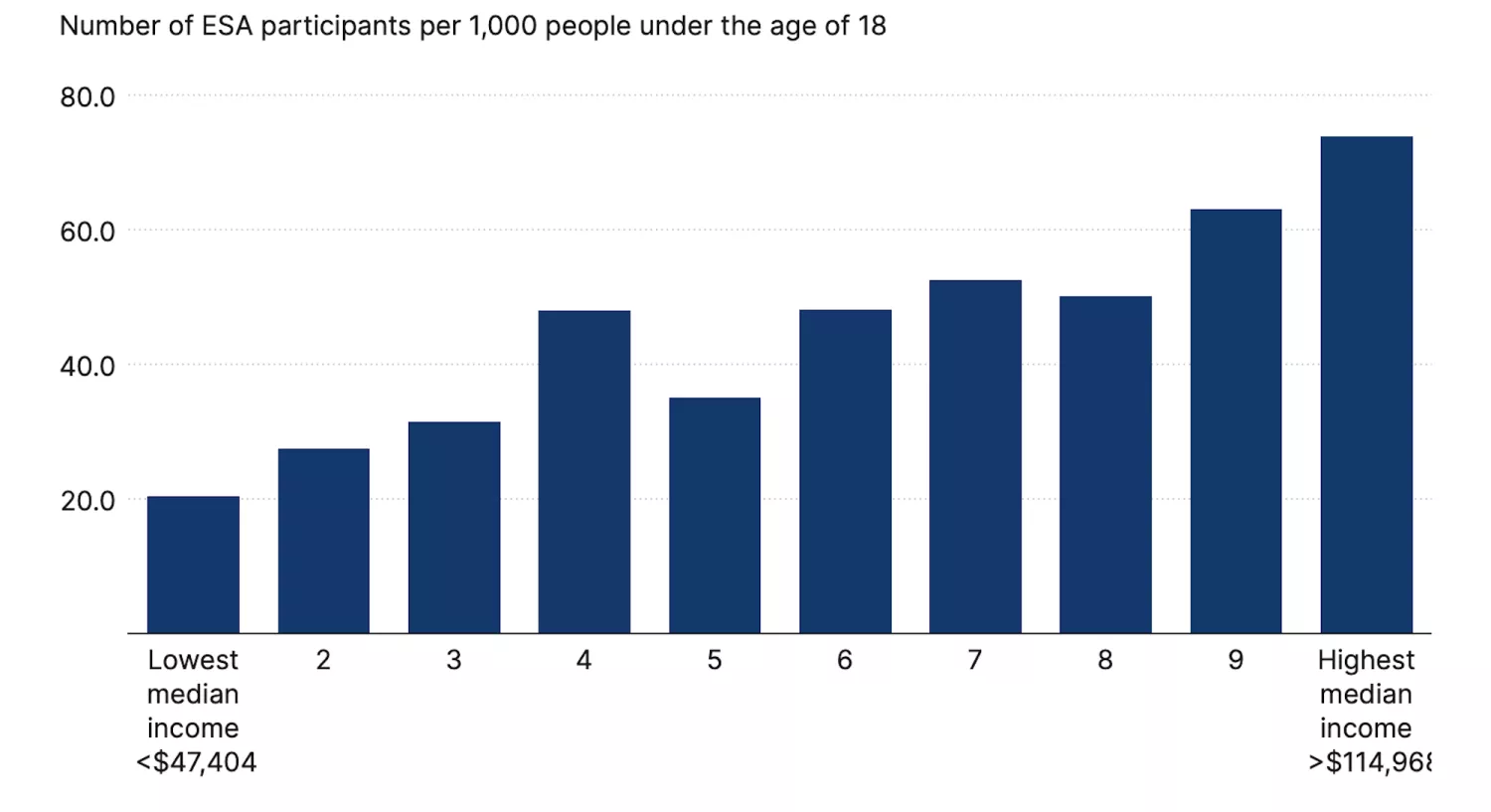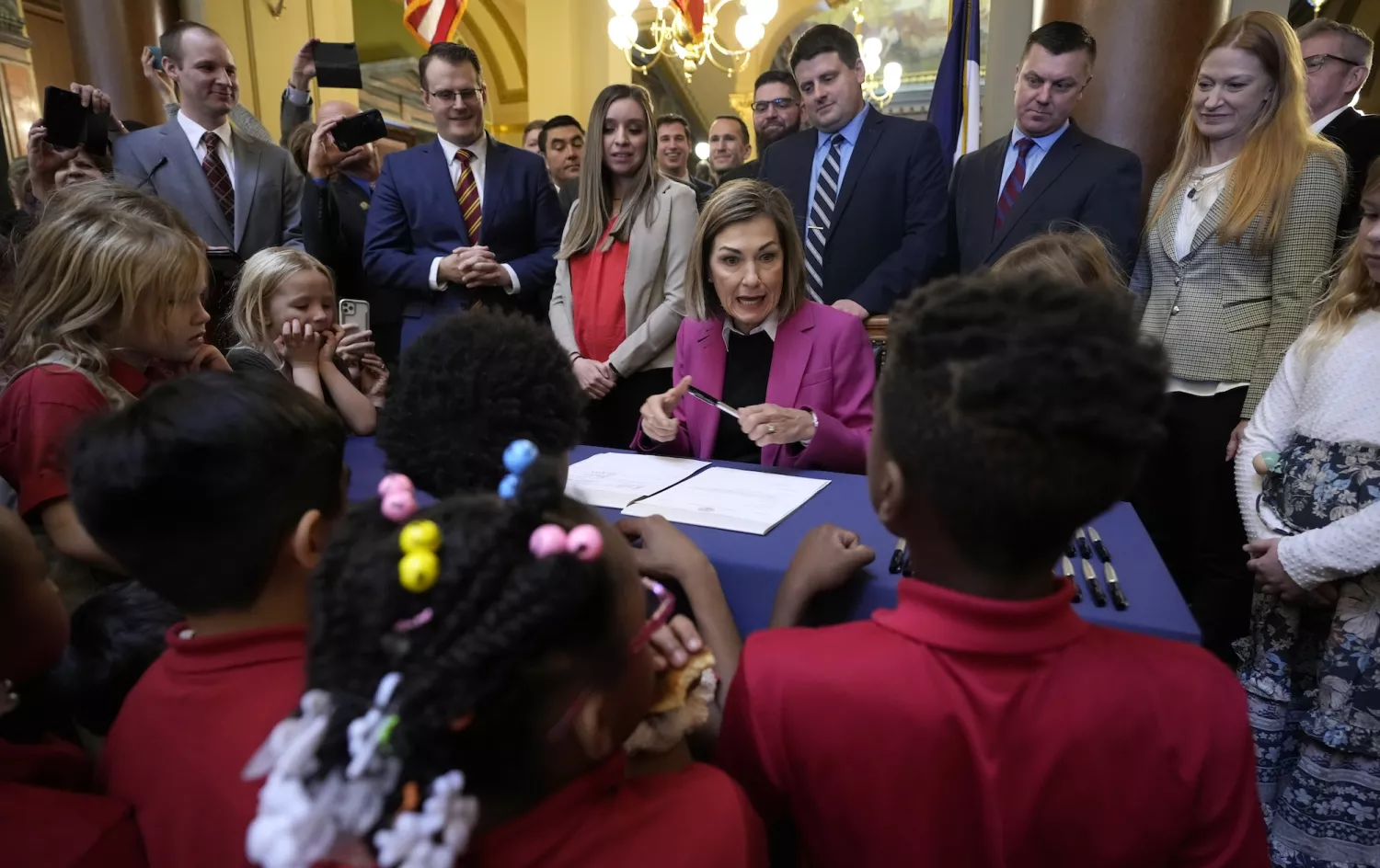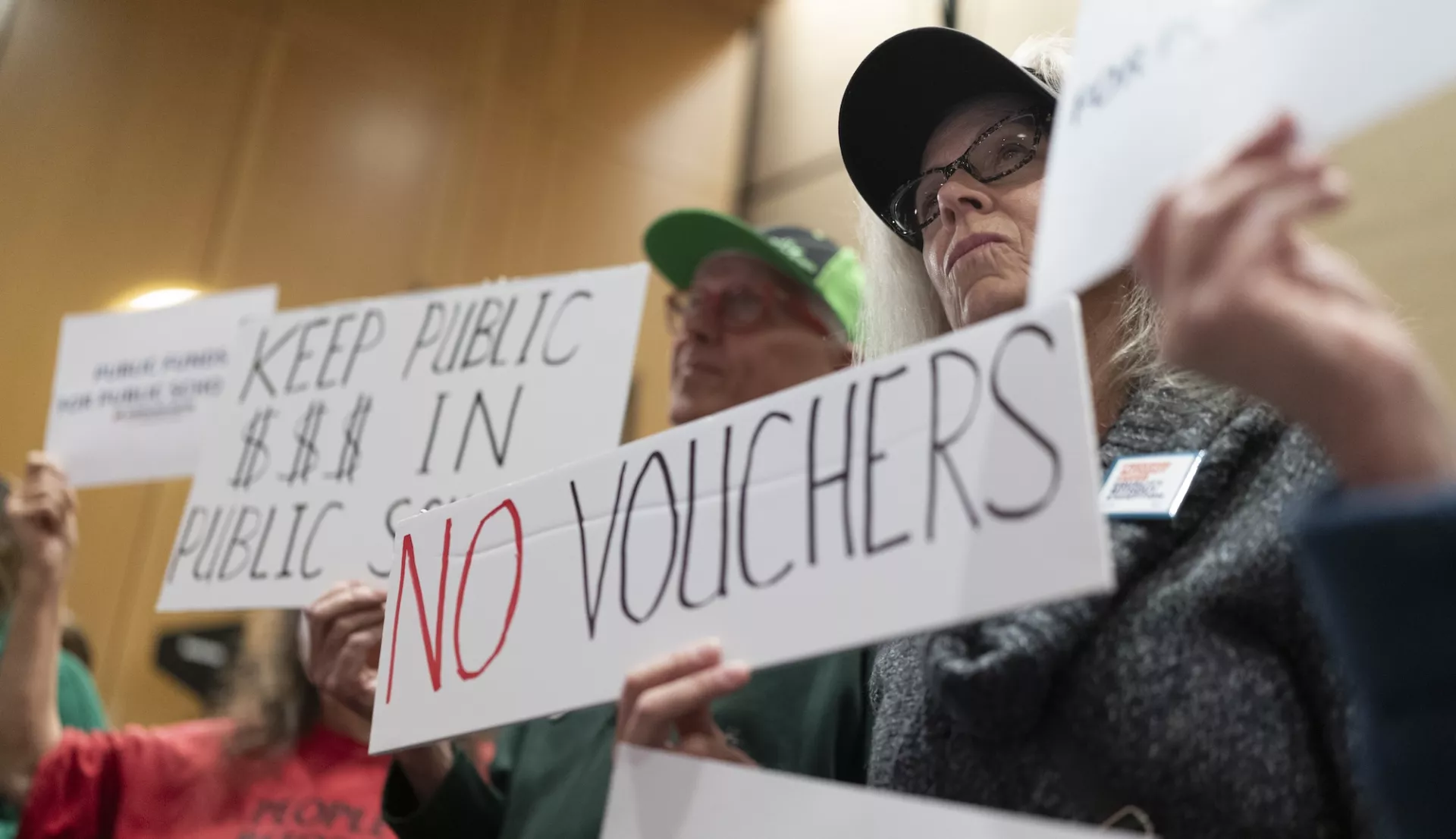
Key Takeaways
- In 2022-23, more state legislatures adopted new or expanded school voucher laws than in any previous year.
- This expansion occurred despite overwhelming evidence showing voucher programs strip funds away from public schools, lack fiscal and academic accountability, and are used primarily by families with children already enrolled in private school.
- In a new book, Josh Cowen, professor of education policy at Michigan State University, explores the roots of the school privatization movement and how school vouchers have gained a foothold and destabilized public education in many parts of the country.
Josh Cowen’s new book is one he wishes he didn’t have to write. A professor of education policy at Michigan State University and a former evaluator of state and local school voucher programs, Cowen would have preferred to write about how the overwhelming, research-based evidence against school privatization helped persuade lawmakers everywhere to reject the use of public funds to subsidize private school tuition. But school voucher programs have expanded, in the face of public opposition and mounting evidence that these programs drain budgets, lack academic accountability, and predominantly serve affluent families.
In “The Privateers: How Billionaires Created a Culture War and Sold School Vouchers,” Cowen explores how school privatization advocates have been able to advance vouchers, beginning with white parents’ resistance to integration in the 1950s all the way through the recent “culture wars.” As Cowen recently told NEA Today, the goal has always been to destabilize the institution of public education, and vouchers serve that purpose.
The 2022-23 state legislative session saw a litany of school voucher bills, more than any previous year. Your book details how the privatization agenda slowly advanced over the years, but it seems almost like a dam broke a couple of years ago. What happened?
Josh Cowen: This is a first draft of history kind of book, in the sense that I was writing it while these bills were being rolled out. I honestly thought they would have receded by the time the book hit the market. In fact, we may just be getting started, unfortunately.
If you look over the past decade, on any standard of professional evidence that researchers have, you really couldn’t find a more comprehensive failure than vouchers. Equally ambitious policy schemes have gone the way of the dinosaur for far less worse results. Teacher evaluations, for example, pushed teachers out who should have stayed, without moving the needle on student outcomes. But not moving the needle is a better result than the catastrophic failure we’ve seen with vouchers.
So why are these bills succeeding now? You can’t look at the voucher question in isolation from the political climate we’re currently in. Why are we also talking about book bans? Why was Ron DeSantis in Florida, who signed the largest voucher bill in the country, asking whether slavery had some economic benefits for enslaved people? Why are there new attacks on LGBTQ+ Americans? These are things you would have thought were beyond the pale three or four or five years ago. This is about destabilizing public education.
A point I make in the book is the Trump presidency saved the voucher movement at a very precarious time, because the results around vouchers were coming in and they were not good. The radicalization of the right, the religious fundamentalism—which I describe in the book as a form of domestic isolationism where children and families fend for themselves—and the culture wars have kept vouchers alive and are the driving energy behind them at this point.
A huge part of that is the use of phrases like “freedom” and especially “parents’ rights,” which advocates use as shields against the overwhelming evidence that vouchers are a failure.

JC: Right. ‘As long as the parents are happy, it's fine.’ This is a talking point that has actually been around forever. We need to acknowledge and affirm the importance of parents as partners in the education space, but “parents’ rights” has deeply negative and nefarious historical connotations, dating all the way back to the post-Brown v. Board of Education world, where your ’rights’ meant you get to segregate your child.
To say parents’ rights is all that matters when evaluating a voucher scheme is absurd and wrong—especially when public schools have to be held accountable for all kinds of metrics.
For example, we can and should continue to have the conversation around test scores, but if the right wing is using test scores to criticize and condemn public school performance, I'm going to put it back on them and say, ‘OK, how do those voucher schools do?’ The answer is horribly.
Public opinion surveys usually show a fairly strong and consistent opposition to using public school funds for private school tuition. Has that changed at all?
JC: The public is generally opposed, but it's also the case that families of color express more interest in programs like vouchers and charter schools than many other families.
Public schools reflect society, which means there’s going to be inequality, and there's going to be a need for more investment and equity in lots of spaces—based on race and income and geographic location, migrant status, etc.
So, it’s not surprising that many of these families would be more amenable to vouchers on paper. But surveys also show that these folks are also more likely to change their minds when presented with the evidence on vouchers.
Vouchers are the education equivalent of predatory lending. The right wing markets vouchers specifically to families of color, to low-income families, as if there are a whole lot of high-quality private school providers that will take all of these children in mass amounts. We know that doesn't happen. We know the schools that do accept them tend to be barely hanging on, tend to be subprime as I call them, as the academic results show.
One of the more troubling aspects of this whole debate is it distracts from real conversations about the work that still needs to be done to make public education better for everybody. If you just sort of take the easy way out and just claim to give everyone a coupon that they'll be able to shop around, it avoids hard questions and hard conversations. And it also directly misleads people.
And voucher programs tend to benefit more affluent families whose kids are already enrolled in private schools. This has gotten a lot of attention recently, but is it a new development?
JC: No. That’s been true since the early days of voucher schemes. The beneficiaries have always been primarily enrolled in private schools. 2007 was the first time researchers started to notice that around 70% of students were already enrolled in private schools—and it's the same number today. I have been making that point in papers, as have other people before me. But it's just now becoming a discussion point because we have so many voucher laws now.

To what extent has disguising and rebranding school vouchers as tuition tax credits or Education Savings Accounts (ESA) contributed to their success in state legislatures?
JC: It’s had a big impact. Of course, it’s all BS because they’re really not much different. All ESAs are vouchers, but not all vouchers are ESAs. They’re not all structured that way.
The ESA model came about because voucher advocates were trying to figure out legally permissible ways to subsidize private school tuition, but in a way that was politically more palatable. It didn't change the underlying fact that it was still a voucher. But the marketing of them as ESAs did add a lot to the momentum we’ve seen recently, no question.
Your book also makes the point that privatization advocates, in addition to being extremely well-funded, are single-minded and relentless.
JC: I speak to superintendents associations as much as I do to teacher groups. The one thing that I have found labor and management agree on every single time is vouchers. But running public school districts is a give and take. Advocating for public schools—there’s a lot of different needs and priorities, right? [NEA President] Becky Pringle is out there doing lots of things. [AFT President] Randy Weingarten is out there doing lots of things
Quote byJosh Cowen, from “The Privateers: How Billionaires Created a Culture War and Sold School Vouchers”

The other side is just singularly focused on vouchers in a way like we’ve never seen. When that's the case, you can be very focused with both your money and your attention.
At the same time, public school advocates have scored some significant victories, pushing back voucher bills in some pretty red states. What are some of the lessons there?
JC: It’s hard to overstate how much these schemes are opposed by many rural Republicans in state legislatures. School are often the biggest employer in their districts. They know the school board members. They know the school superintendents, who are like mayors in those communities. “Friday Night Lights” is a real thing in Texas. So, parents, school boards, the superintendents in rural areas support their public schools, oppose vouchers, and have helped keep these bills at bay.
Public school advocacy groups are working really hard on the ground to push these bills back. But the money being spent by voucher groups is targeting these anti-voucher Republicans in primaries, to get them out of state legislatures and put in place people who are much more supportive of vouchers. That’s what happened in Iowa and we’re seeing it in Texas. But as long as those rural lawmakers are in office, those alliances are absolutely critical in fighting these bills.

And earlier this month, the South Carolina Supreme Court struck down that state’s voucher law. [NEA, on behalf of the South Carolina Education Association, filed the case, Eidson v. South Carolina Department of Education in 2023). And vouchers will be on ballot measures in November.
JC: Yes, that was a big win in South Carolina. The justices saw the law for what it was. They said—and they used this phrase—that setting aside the “window dressing,” this is a subsidy for private schools and what the constitution says is pretty simple. There are different ways of spinning it, different policy vehicles, but this is public money going to private schools, and the state can’t do that.
The court using the phrase “window dressing” is important, because that's been what I've been trying to say for a long time. It goes back to ESAs, what we were talking about earlier, the use of language. At the end of the day, vouchers are a subsidy for private school, right? We can have debates about whether or not we should do that, but let’s not pretend that’s not what is going on.
On ballot measures, the other side has fought very hard to keep vouchers away from voters, because they know vouchers have never won statewide by ballot. Nebraska will be voting whether to repeal the voucher law. The law's advocates went to court to make sure that didn't happen but failed. They know what the record is.
Overall, the news is pretty alarming. Vouchers have made significant headway. What do you see over the next few years?
JC: Well, I don’t think voucher expansion has hit the ceiling yet. Again, like I say in the book, it’s this larger political moment we’re all living in. This could end up looking like the differences and divisions between the states over reproductive rights. And unfortunately, we're probably a long way from being able to make a difference on the Supreme Court.
There is no such thing as a good voucher law. But something I'm interested in is the need to have conversations about how to make these things better for kids and families where vouchers do exist. These laws are not gonna go away overnight, even if they're phased out.
But looking ahead, we need to continue to oppose school privatization and the radicalism that has undermined public schools. At the same time, the positive, forward-looking policy is to fully fund public education. For years, the right wing said all we're doing is throwing money at a problem without academic results. It was kind of taken as gospel. As it turns out, we have strong, social science-based research evidence that shows that investments in public schools do have direct pay-off over the short run and over the long run—on academics, on later-in-life outcomes like wages, and so on. The people pushing privatization know this, which is why they have tried to establish a deep-rooted skepticism about our schools around these culture war issues.
Children are better off when we fund public schools. This is as clear as the evidence pointing to the failure of vouchers. It’s the right thing to do and it works.
